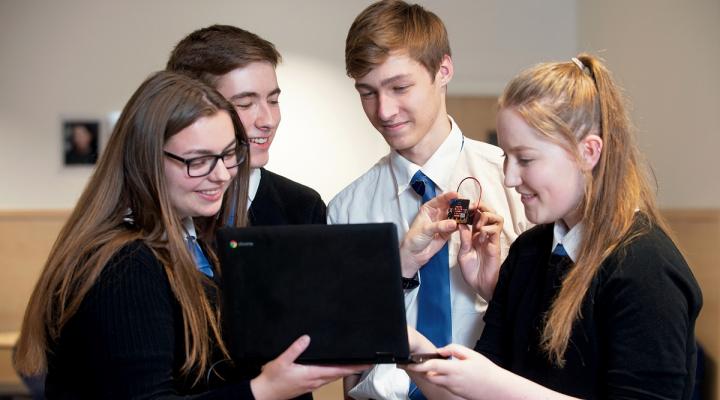Building the school of the future
A University partnership is leading the way in putting data to work in the classroom.

Somewhere beneath the ground, at the entrance to Newbattle High School’s new Community Campus, lies a tube containing multimedia representations of school life in 2017. The lid bears the inscription, “The Newbattle Centre Time Capsule To Be Opened in 2077”.
Certainly by then school life will have changed, perhaps beyond recognition.
However, work being done by the University, in partnership with Newbattle Community High School and Midlothian Council, may offer a hint of things to come.
Enchancing digital skills
Newbattle Community High School’s new campus opened in June 2018, having been designated a Digital Centre of Excellence the year before. In September, it hosted a data science workshop to launch the City Region Deal’s Data-Driven Innovation Initiative. Midlothian Council’s objectives for the new facility are to develop an understanding of how digital technology enhances learning, and equip students for the future workplace.
Digital skills, systems thinking, and creativity are widely seen as important attributes for future employment, and data skills and know-how are at their core. For Depute Head Mark Davidson, that’s where the partnership comes to the fore. “We’ve been working with the University, Skills Development Scotland and other partners in anticipation of a surge in ambition around data-driven innovation, centred on Edinburgh’s goal of becoming data capital of Europe.”
The University hosted a Continuing Professional Development day for staff, to explore what it means to be a Digital Centre of Excellence. “It’s all very well to have fine words,” explains Professor Judy Robertson, Chair in Digital Learning at the Moray House School of Education and lead academic in the partnership, “but you need teachers to go and put them into practice.”
The day offered workshops such as using split classrooms to reduce from-the-front teaching, and a computational thinking and coding session. “It was a really good day, and the teachers were incredibly enthusiastic,” says Professor Robertson.
Leading the class
The team at Moray House, and their school counterparts, began developing ideas in more detail. They devised approaches to teaching and learning with digital technology for each subject area, not just in traditional qualifications like Highers and Nationals, but also in the vocational National Progression Awards and Foundation Apprenticeships.
“I visited the school recently for another data science workshop,” Professor Robertson adds. “You can see the kids take a real pride in their new building. We have to make sure that doesn’t wear off.” That requires ongoing effort in the coming years. “You can’t just call yourself a Digital Centre of Excellence and expect to be one. It takes a lot of hard work.”
One contribution is the creation of a cohort of student digital leaders. They receive training to provide technical support for teachers, and for school and community events. This highlights their digital skills, teaches them responsibility, and promotes interpersonal development. “That’s the kind of thing that will embed digital excellence in the longer term,” says Professor Robertson. In addition, specialist learning technologists have been appointed to ensure seamless integration of technology in the classroom.
Another important factor can be found in the material side of digital technology. Working with data is not all theoretical, as digital learning consultant Mr Craig Steele is quick to point out. Brought in by the University to share his expertise in making data science attractive to young people, Mr Steele presents his flexible approach with infectious enthusiasm.
“There is a myth that computer programming is really difficult, or you’ve got to be a genius to do it, which is definitely not true,” he insists. While some might show a particular aptitude for it, the reality is that many young people simply haven’t had the chance to try their hand at working with data. Mr Steele runs workshops at Newbattle inspired by the students’ ideas, where they can try, fail, and try again, leading to some impressive results.
Monitoring success
For instance, a data visualisation project called Everyone Makes a School is based on the principle that everyone matters to the school and can have an impact on it. “The idea behind it was that this fantastic new building is not just made of bricks and mortar, but by the people inside it,” Mr Steele explains, describing how the project uses digital technology to celebrate the whole school community.
Data about movement in and around the campus will be collected and converted into signals that could, for example, power a mosaic of lights. “It looks best when there’s full attendance,” adds Professor Robertson. “When somebody’s not there, there’s a little bit missing.” Eventually, the students will have created a unique piece of public, data-driven art, showcasing what it means to be part of their school.
Both the University and Newbattle are ensuring access to data science and technology for all, explains Professor Robertson: “We want it to become business as usual, something that everybody does.”
“The other thing we’d like to do is make Newbattle Digital Centre of Excellence a knowledge sharing school,” she continues. “We have the ambition and the willingness to share with other schools how we are making change happen at Newbattle.”
We have the ambition and the willingness to share with other schools how we are making change happen at Newbattle.
Nobody can predict exactly what school will be like in 2077, but the University is offering a glimpse through its partnership with Newbattle and Midlothian. It will likely be an equitable and technologically-enabled place, porous to its community, where learning empowers all to achieve their best, and to have the chance to realise their dreams.
Video
Meet the students learning data skills at part of this initiative by the City Region Deal.

